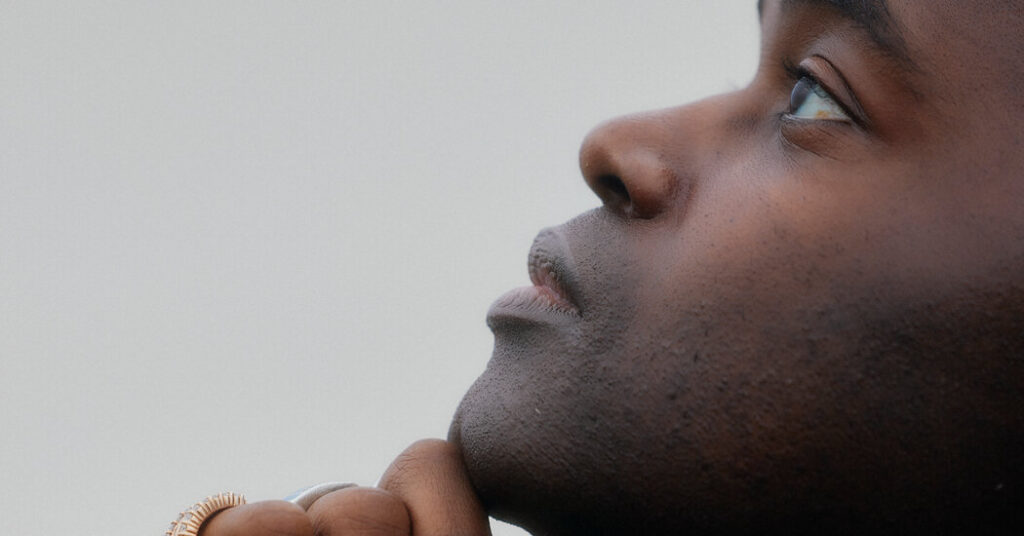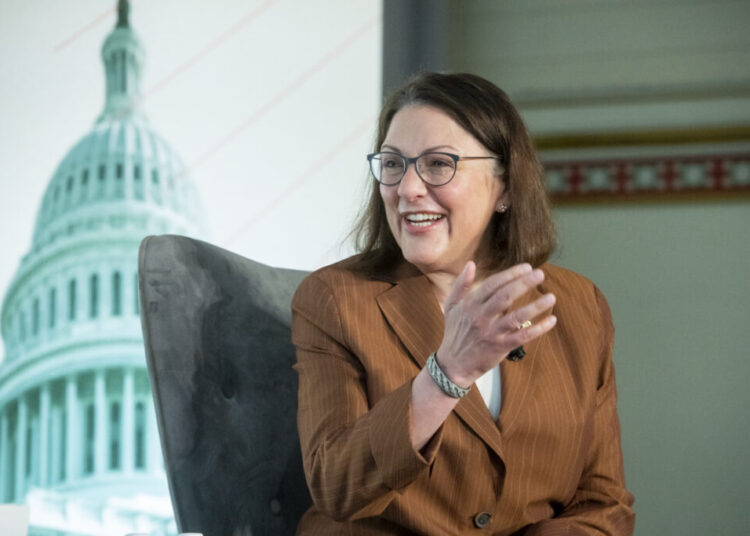While driving to hear the countertenor John Holiday at Wolf Trap in Vienna, Va., I cued up a track from his coming album, “Over My Head”: “Strange Fruit,” the famous Billie Holiday song about lynching in the South. The voice that leaped out of the car speakers was high and clear, incantatory and sad. With its emotional directness and succulent, purring vibrato, it could have been a long-lost recording by Sarah Vaughan.
A bluesy, poetic lamentation of intergenerational trauma is a bold choice for an opera singer’s debut solo album, which would typically feature 19th-century art songs or classic arias. But John Holiday isn’t that kind of artist.
“I didn’t want to be a countertenor out there recording more Vivaldi, which I can do, or Handel, which I can do,” Holiday said in an interview. “I wanted it to be something that they’d never heard somebody like me sing.”
That statement could be Holiday’s artistic manifesto. His repertoire, just like his vocal quality, resists categorization and easy description.
Like most countertenors, Holiday’s classical repertoire leans heavily on Baroque and contemporary music, with performances this season of Handel’s “Messiah” with the New York Philharmonic in December and Philip Glass’s “Akhnaten” with Los Angeles Opera starting in February.
Yet, this season, he also sang the Sorceress in Purcell’s “Dido and Aeneas” and Cherubino in Mozart’s “Le Nozze di Figaro,” roles typically performed by women. And in a true departure for classically trained countertenors, he appeared on the reality talent competition “The Voice” in 2020, making it all the way to the finals with songs by Frank Sinatra, Celine Dion and Beyoncé as a member of John Legend’s team.
“As soon as I left school, one of the things that I was discovering is that I wanted to be very true to who I was and who I am as a human being,” Holiday said. He earned degrees from Southern Methodist University, the University of Cincinnati College-Conservatory of Music and the Juilliard School, where he sang the title role in Handel’s “Radamisto” in 2013. Even then, he displayed a liquidly feminine tone and an instinct for bravura. It seemed his intent in each aria was to determine his highest note in the key and figure out the fastest way to get there. He perked the opera right up.
For Holiday, being true to himself means weaving together the loose strands of opera, gospel, R&B, jazz and pop that make up his musical life and inheritance. “For a while, I felt like I couldn’t get people to really see me or hear me,” he said. “And I thought, I’m going to create my own thing, and that’s what I did.”
The result was “The John Holiday Experience,” a cross-genre recital format that he brought to Wolf Trap in May. He told stories about himself and his family, ceded the floor to the pianist Jeanne-Minette Cilliers to make her own remarks, walked through the audience and accompanied himself at the piano. His accomplished playing in Gershwin’s “Summertime,” like his singing, swooped and twinkled. He also mashed up the spiritual “Over My Head” with “This Little Light of Mine,” and for the first time, I realized that the feel-good children’s gospel tune is about the way every person’s contribution to the world is special, no matter how small it is.
“I’ve called it ‘The John Holiday Experience: Red, White and Blue,’ I’ve called it ‘The John Holiday Experience: Christmas Edition,’” he said. “There’s been many iterations of it, but it’s just me. It’s me being my full-hearted, full self.”
The gospel and traditional R&B influences come from his upbringing in Texas and what he called his “huge church background.”
“I would be in church every day because my grandmother was the music minister of the church where I got baptized at in Houston: Calvary Way Missionary Baptist Church, off of Hirsch Road, as they would always tell us to remember,” Holiday said. As a teen, he started playing piano in churches, too. At his aunt’s and grandmother’s houses on Friday nights, he was exposed to music by singers like Johnny Mathis, Ella Fitzgerald, Luther Vandross and Patti LaBelle while he watched everyone play card games like Tonk.
“They were all teachers, all these African American women,” he said, “and Friday night was their release.” (He still doesn’t understand how to play Tonk, by the way.)
As a singer, Holiday’s tone is lambent and pure. It conveys dimension without dark edges. It’s also hard to pin down: ageless and weightless, innocent and eloquent, fragile and defiant. It has a tender way of curling back on itself in quiet moments, and he can unsheathe it in a coruscating blaze of light.
“The voice is the voice of a shaman,” said the director Barrie Kosky, who has worked with Holiday several times, most recently in a production of “Akhnaten” at the Komische Oper in Berlin. “In that Philip Glass opera, there’s no story, there’s no narrative, there’s not even any psychology. That’s not what the piece is about. So, you need to have someone who can stand on that stage and they bring their entire life experience onto the stage and somehow connect us with the cosmic, which is what John does.”
Holiday, he added, is also a chameleon. “OK, he’s played some gender-bending roles, but John can play anything,” said Kosky, who thinks that it’s easy to focus too much on the gendered sleight of voice. “He can play a boy, he can play a girl, he can play a woman, he can play a man, he can play a king, he can play a queen.”
Holiday’s voice is so natural that it lacks the kind of artificial manufacture that some countertenors cultivate, allowing him to slip into an unusually broad repertoire. When he auditioned for “The Voice,” he sang a shiny, elastic version of “Misty,” tucking blue notes into his runs and opening up to a wail on top. The show’s producers played into his high-flying, gender-defying vocals by hiding his face from the cameras until the song almost ended. Kelly Clarkson and Gwen Stefani’s jaws dropped when they turned their chairs around to face him.
In “Figaro,” at the Washington National Opera, Holiday played the page boy Cherubino, a trouser role traditionally performed by a mezzo-soprano in drag. Robert Spano, the opera’s music director, who led the show’s recent run, said that it was “extraordinary” to witness a countertenor singing the part. “I’ve never encountered it,” he added. “There’s wonderful actors, singing actors, who perform the role of Cherubino and capture the adolescent nature of the character in a wonderful way. But there’s something about having a man do it that just becomes so electric somehow, because you realize that Cherubino is a kind of Count-in-the-making in his wandering eye and appetite.”
Over the summer, during preparations for “Figaro,” Holiday was uncertain about how he’d pull it off. “This is how it has worked in my life: Anything that I’m afraid of, I run toward it, because oftentimes, what’s on the other side of fear is your success,” he said. What he did know was that he wouldn’t sound like mezzos who have sung the part. “I can’t. Because they are them and I am me, so we will see.”
Unusually delicate in tone and randy in temperament, Holiday’s Cherubino was a bundle of sexual energy and paper-thin extroversion, the kind that collapses quickly under the weight of a teenager’s insecurity. The casting of a woman can convey an adolescent’s higher-pitched voice, but Holiday’s fragile timbre and heart-on-his-sleeve demeanor also captured the character’s vulnerability.
“When I was very, very young, there’s the idea of wanting people to want you, wanting people to find you attractive, wanting to be wanted by everybody else, or not having that, and being like, ‘Oh, my God, you’re so beautiful,’” Holiday said. Remembering that part of himself helped to unlock the character for him. “Of course, I’m not at all interested in women, but it is really fun to take that mentality on. I’ve definitely had that part of my life as a young gay guy, I guess, wanting to be surrounded by beautiful, beautiful, beautiful men.”
Holiday also thinks that Cherubino’s obsession with women is threaded with awe and adoration, based on the score markings that accompany the word “donna” (“woman”) in the aria “Non so più.” “It’s absolutely denotated as piano whenever he says ‘donna,’” he said. “Mozart wanted Cherubino to sing that word with love and gentleness.”
He took the liberty of ending the aria with what Spano called an “erotic melisma,” using a Renaissance-style trill to simulate uncontrolled sexual arousal in a brief cadenza. In her scintillating performance as Susanna, Joélle Harvey averted her eyes in embarrassment. It was funny but also oddly intimate.
“He’s very savvy about his own vocal instrument and how to use it, whatever the genre, and I don’t know that that’s true of every singer in the world,” Spano said. “He’s got a special gift that way. He’s able to meet the stylistic difference and play with it, but without leaving his own voice.”
It’s an unusual skill, especially in a genre like opera, which puts a premium on perfectionism, fidelity and historical practice — and Holiday shares it with the revered dramatic soprano Jessye Norman. Norman knew Wagnerian and Straussian style, but her devotion to it wasn’t slavish; it was the jumping-off point, not the whole point, of her interpretation. Whether he’s singing a jazz standard or Mozart, Holiday has a way of disappearing into musical styles while remaining his highly recognizable self.
The golden rule for any opera singer, Kosky said, is that the voice is authentic. “We live in an age where there are so many singers that sound like a hundred other singers,” he added. “John sang like that as a boy. That’s the way John sang. And teachers helped him, conductors nourished him. But that’s John. And I just love the fact that he’s so in himself.”
Holiday’s willingness to go his own way doesn’t come without doubts. He doesn’t read reviews, but every time I’ve talked with him, he started by asking whether his performance was OK. Still, his belief in himself persists.
“I was telling myself yesterday: ‘What if I were made for this? What if I am great? What if God made me just for this moment? What if I could do it?’” he said. “Instead of telling myself all the reasons why I can’t, and then I show up. Then you show up, and you’re able to do it.”
The post Equal Parts Baroque and R&B, John Holiday Is His Own Singer appeared first on New York Times.




